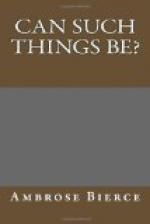And Hastur, knowing that Haita was a youth who kept his word, spared the cities and turned the waters into the sea.
So he had lived since he could remember. He could not rightly conceive any other mode of existence. The holy hermit who dwelt at the head of the valley, a full hour’s journey away, from whom he had heard the tale of the great cities where dwelt people—poor souls!— who had no sheep, gave him no knowledge of that early time, when, so he reasoned, he must have been small and helpless like a lamb.
It was through thinking on these mysteries and marvels, and on that horrible change to silence and decay which he felt sure must some time come to him, as he had seen it come to so many of his flock—as it came to all living things except the birds—that Haita first became conscious how miserable and hopeless was his lot.
“It is necessary,” he said, “that I know whence and how I came; for how can one perform his duties unless able to judge what they are by the way in which he was intrusted with them? And what contentment can I have when I know not how long it is going to last? Perhaps before another sun I may be changed, and then what will become of the sheep? What, indeed, will have become of me?”
Pondering these things Haita became melancholy and morose. He no longer spoke cheerfully to his flock, nor ran with alacrity to the shrine of Hastur. In every breeze he heard whispers of malign deities whose existence he now first observed. Every cloud was a portent signifying disaster, and the darkness was full of terrors. His reed pipe when applied to his lips gave out no melody, but a dismal wail; the sylvan and riparian intelligences no longer thronged the thicket-side to listen, but fled from the sound, as he knew by the stirred leaves and bent flowers. He relaxed his vigilance and many of his sheep strayed away into the hills and were lost. Those that remained became lean and ill for lack of good pasturage, for he would not seek it for them, but conducted them day after day to the same spot, through mere abstraction, while puzzling about life and death—of immortality he knew not.
One day while indulging in the gloomiest reflections he suddenly sprang from the rock upon which he sat, and with a determined gesture of the right hand exclaimed: “I will no longer be a suppliant for knowledge which the gods withhold. Let them look to it that they do me no wrong. I will do my duty as best I can and if I err upon their own heads be it!”
Suddenly, as he spoke, a great brightness fell about him, causing him to look upward, thinking the sun had burst through a rift in the clouds; but there were no clouds. No more than an arm’s length away stood a beautiful maiden. So beautiful she was that the flowers about her feet folded their petals in despair and bent their heads in token of submission; so sweet her look that the humming birds thronged her eyes, thrusting their thirsty bills almost into them, and the wild bees were about her lips. And such was her brightness that the shadows of all objects lay divergent from her feet, turning as she moved.




